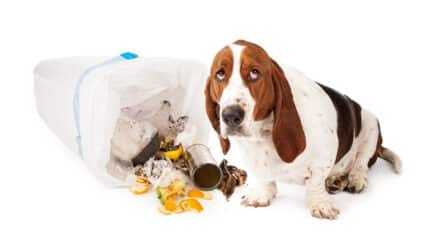Before you feed peppermint to your dog, you want to be sure that you will not do any harm. You may be asking yourself if peppermint is even safe for dogs. Just because it seems safe for humans, never assume something is safe for your pet. Before you feed your pup anything new, you should always ask your veterinarian for advice.
The first thing to know is that peppermint can be found in different preparations, such as the leaf itself, extract, or peppermint oil. Not all of these are safe for canine consumption. It is often used in tea, candies, gum, toothpaste, skin ointments, nasal sprays, candles, and aromatherapy oils.
You may not have deliberately fed any of these to your pup, but they could be exposed accidentally. Some of these products may be dangerous because of other ingredients the peppermint has been mixed with. So, what’s the protocol? When should you feel the need to call your vet? Let’s jump in and find out.
Is Peppermint Safe For Dogs?

Peppermint can be safe for dogs, but you need to know when it is ok, how much to give, and how to use it safely. Before you use it with your pup, contact your veterinarian, who will be able to discuss whether this is the best thing to do.
Some dogs are given peppermint for:
- Bad Breath
- Upset Stomach
- Flea & Tick Protection
- Nutritional Supplement
- Relaxation
- Treats
- Immune System Boost
- Skin Issues
- Medicinal Alternative (Natural)
When Is It OK To Give A Dog Peppermint?
Peppermint leaf is the safest form to feed dogs. It’s usually found raw or in tea, for example. While peppermint leaf is not toxic to dogs, they can only eat minimal amounts and be limited to no more than 1-2 leaves per day. In large quantities, the leaves can cause vomiting and diarrhea.
Some dog foods may contain peppermint as an additive in small amounts. Pet food companies are regulated to ensure they don’t produce food that could be toxic or harmful to your pet. So, you can be confident that mint prepared this way is safe for most dogs to eat. Mint is added to some pet food as a source of vitamins and minerals. It is also sometimes added to dog treats as a flavoring or in dental chews to help with bad breath.
Are There Any Nutritional Benefits?
The leaf contains essential nutrients, such as vitamins A and C, flavonoids, rosmarinic acid, and iron, which are vital for keeping Fido healthy. These nutrients are thought to be:
- Anti-oxidant
- Anti-inflammatory
- Anti-tumor
- Anti-allergenic
- Anti-bacterial or Anti-viral
However, peppermint contains them in tiny amounts, and we don’t know if dogs can absorb these nutrients by eating the leaves.
Can Peppermint Hurt My Dog?

Unfortunately, there are more risks for canine peppermint ingestion than there are benefits. Peppermint contains a mixture of different chemicals, which give it a strong smell, taste, and sensations such as cooling. However, exposure to some of these chemicals can be dangerous. Your furry friend may be more sensitive to the harmful effects if he is young, old, or has underlying health problems such as liver disease.
There are several preparations that may cause harm to your canine companion. So, be sure to contact your veterinarian if your dog has been exposed to any of these:
- Candies or gum
- Essential oils or aromatherapy oils
- Natural flea or tick products
- Cosmetics (toothpaste or skin ointments)
- Medicines containing by-products (Menthol, Nasal Sprays)
Peppermint Candies

Peppermint treats such as candy, candy canes, peppermint jelly beans, and peppermint bark contain peppermint oil. The oil in these treats is very concentrated and can cause diarrhea or cause them to vomit.
Some peppermint treats may only contain extract, which is less concentrated than oil. However, the extract can still cause an upset tummy, so it is always best to avoid it.
Peppermint bark is combined with chocolate, which is toxic to dogs. Never offer any dog chocolate, as it can cause vomiting, diarrhea, heart problems, seizures, or death. I treat dogs regularly that have eaten chocolate (often accidentally) as it’s so tempting to them. Most owners know that their dog has eaten chocolate, so I make them vomit to bring it up. In my experience, most cases are dealt with this way. Occasionally, I treat dogs with more severe symptoms that need treating as inpatients in the clinic.
Some candies and gum contain a sweetener called xylitol. If xylitol is eaten by your dog, it can cause low blood sugar, which is a life-threatening emergency. If left untreated, it can cause liver failure, seizures, coma, and death. Others contain palm oil, which can cause a painful and sometimes fatal condition called pancreatitis if eaten. Call your vet immediately if Fido has eaten anything containing xylitol or palm oil.
Candies also have lots of sugar in them and can put canines at risk of developing diseases such as obesity, diabetes, or dental disease. You can contact your veterinarian for advice on which healthy treats are safe.
Essential Oils

Peppermint oil is highly concentrated and should not be given to canines. If your pup licks even a small amount of oil, it can be absorbed very quickly. It can cause severe irritation to their stomach or mouth. It can also severely damage their liver and cause death. Other signs of peppermint oil toxicity in dogs if they have eaten it are vomiting, diarrhea, drowsiness, trembling, or dizziness.
Some people want natural alternatives to prescription flea treatments for their dogs. Spot-on flea treatments containing essential oils can be bought without a prescription. As many as 92% of pets can react badly to these and develop toxicity signs when applied to the skin.
There’s also a high risk of the oils being licked off if they are on the dog’s skin or fur. Some of the chemicals in peppermint (e.g., pulegone) are used in organic farming as natural pesticides. Still, we don’t know how effective the oil is at killing fleas or whether it is safe. In humans, even small doses of pulegone can cause damage to the liver. So, it’s best to avoid using essential oils and ask your veterinarian for alternative flea products that are safe and effective.
A dog’s sense of smell is more than 10,000 times greater than our own. When dogs smell peppermint, it can cause breathing problems and irritation to their nose and eyes. Plug-in diffusers, aromatherapy oils, or scented candles could cause these issues.
Medicines And Cosmetics

Peppermint is used as a flavor, scent, or additive for medicinal benefits to over-the-counter or herbal remedies. Cosmetics often use oil or extract, which we know can be toxic to our dogs if eaten or applied to the skin. Creams or ointments that contain peppermint may cause skin reactions and should be avoided. Your pup may lick the skin where you have used the treatment and develop signs of toxicity.
Bad breath can be a sign of illness, such as dental or oral disease, gut disease, or kidney disease. So, take Fido to the veterinary clinic to have this checked out first. Your veterinarian will give you advice on how to look after their teeth and gums with dog-safe toothpaste.
Some medicines may contain menthol, which is one of the chemicals contained within the leaf. Menthol gives mint its cooling sensation. It’s also used as a very mild anesthetic in humans. You may find it in medicines such as nasal sprays. If your pup inhales the scent, it can cause breathing problems, irritation to the nose or eyes, and stomach or mouth problems if eaten.
Peppermint is often used in traditional medicine. Unless you have the knowledge or experience in these subjects, it’s best not to attempt to treat their illnesses at home. Herbal remedies are not under the same strict regulations as prescription medicines.
If a product is sold as natural or organic, it is not the same as saying it is safe. Herbal products are widely available, but the contents may differ from what is described on the packaging. Some of these products are contaminated with harmful chemicals. Until we have more information about these products’ safety and benefit, it is best not to use them.
Frequently Asked Questions
Can dogs eat peppermint candy canes?
Check the ingredients. Some contain xylitol or palm oil, which can be very harmful to your dog in any amount. If your dog has eaten anything containing these, you must seek veterinary advice urgently.
Can dogs eat peppermint oil?
No, don’t feed your dog peppermint oil, as its high concentration can cause irritation to your dog’s mouth or gut and cause liver damage. Your dog will be at greater risk if young, old, or has underlying health issues.
Can dogs eat peppermint leaves?
A small number of peppermint leaves (1-2 per day) or dried mint may not harm your dog. But it can cause vomiting or diarrhea. If your dog has eaten a large number of mint leaves, contact your veterinarian for advice.
Does peppermint help a dog’s upset stomach?
In dogs, we don’t yet know if peppermint is helpful in relieving an upset stomach. You may make your dog’s condition worse by giving them peppermint. If your dog has an upset stomach, it’s best to contact your veterinarian for advice.
Does peppermint oil kill fleas on dogs?
We don’t know how effective peppermint oil is at killing fleas, but it is best to avoid using peppermint oil on your dog’s skin. It can cause skin reactions, breathing problems, and gut issues if your dog licks it. Your veterinarian will be able to provide you with effective and safe flea preparations for your dog.
Final Thoughts
Peppermint is only safe for canine consumption in small quantities and in leaf form. We are still waiting for enough information about the nutritional and medical benefits of giving peppermint to dogs, especially as higher concentrations aren’t safe.
Feeding your pup a complete and well-balanced diet is the best thing you can do to ensure they are receiving all the essential nutrients required to keep them healthy. You can contact your veterinarian for nutritional advice. They will be able to tell you what to feed your dog.
The medical use of peppermint has not yet been approved. So, ensuring Fido has a healthy lifestyle with plenty of exercise and not too many treats will keep him as fit as possible. When your pet becomes ill, contact your veterinarian, who will know what is safe to use to treat their illness.
Finally, always ask your veterinarian for advice before supplementing their diet or using home remedies.





